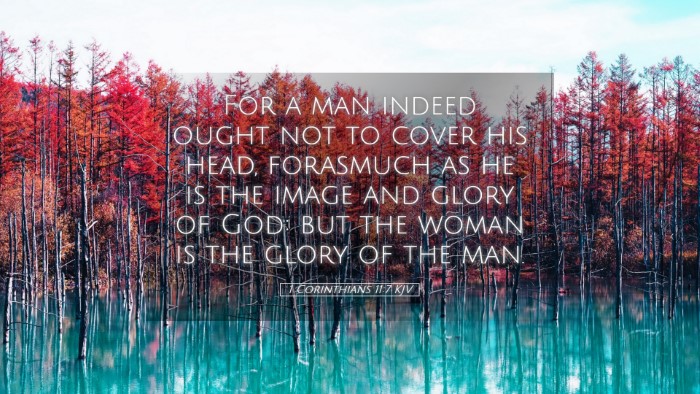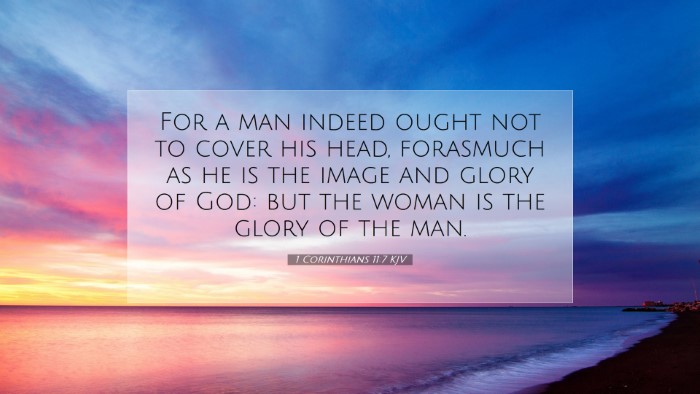Commentary on 1 Corinthians 11:7
Verse Text: "For a man indeed ought not to cover his head, forasmuch as he is the image and glory of God: but the woman is the glory of the man." (1 Corinthians 11:7)
Introduction
This verse serves as a pivotal expression in Paul’s discourse regarding the practice of head coverings and the relationship between men and women within the Church. It articulates theological truths that are fundamental both to the understanding of gender roles and the divine order established from creation.
Contextual Analysis
In 1 Corinthians 11, the Apostle Paul addresses various issues concerning public worship and church order. The specific cultural and social context of Corinth is essential to grasp the meaning of this verse. Corinth was a cosmopolitan city characterized by its diverse influences, including Hellenistic culture, which often promoted egalitarian views undermining traditional roles.
Significance of Head Coverings
Paul’s teachings on head coverings must be interpreted not simply as a cultural command but as a theological statement. By stating that men should not cover their heads, Paul emphasizes the notion of man being created in the "image and glory of God.” This designation underscores the divine authority and responsibility inherent in man’s position before God.
- Matthew Henry: He elaborates on the concept of man’s glory, noting how it refers to his role as God’s representative, reflecting God’s image. He further asserts that a man’s uncovered head symbolizes his direct relationship and responsibilities before God.
- Albert Barnes: Barnes offers insights on the interpretative angle of this verse, suggesting that it emphasizes the honor and responsibility of man as the one who leads and provides spiritually. He highlights the importance of recognizing divine order in gender roles.
- Adam Clarke: Clarke emphasizes the creation order here, discussing how man is created first and has been given authority, but also how this authority comes with a moral obligation to lead with love and humility that reflects God’s own nature.
Theological Implications
This verse reveals profound truths about the nature of God’s creation. What Paul declares in this verse is rooted in the theological understanding that mankind, created in God’s image, is given a unique role and purpose.
Image and Glory
Paul makes a distinction between the man and the woman, with each embodying aspects of divine glory. The man is described as the “image and glory of God,” indicating his role in fulfilling God’s purposes on Earth. Conversely, the woman is designated as "the glory of the man," which some commentators see as emphasizing her supportive role in reflecting the beauty and order in creation.
1. Man as Image of God
Man's creation in God's image indicates his capacity for rational thought, moral accountability, and the calling to represent God’s character and will to creation.
2. Woman’s Role in Creation
The formulation that the woman is the “glory of the man” does not degrade her worth; rather, it illuminates her purpose as a counterpart, helping to fulfill God's divine plan. As Adam Clarke notes, this relationship is vital for understanding the interdependence within the created order.
Cultural Considerations
Understanding 1 Corinthians 11:7 also requires an awareness of the cultural practices of Paul's time. In Corinth, head coverings were a cultural sign of modesty and propriety, especially for women. Paul addresses cultural expressions of spiritual truths, providing an example of how cultural customs can reflect theological concepts.
Application for Today
For pastors, students, and theologians, this verse serves as a reminder of the importance of adhering to biblical principles while navigating cultural practices. The emphasis on divine order and the honor of both genders should lead to discussions about how to apply these biblical truths in contemporary worship settings.
- Encouragement for the Church: The church today must emphasize that both men and women hold unique but complementary roles in the body of Christ, each contributing to the overall spiritual life of the church community.
- Discussion on Gender Roles: This verse could stimulate in-depth discussions on gender roles within contemporary society and the church, encouraging a balanced view that respects the differences but equally acknowledges the shared worth and dignity before God.
Conclusion
1 Corinthians 11:7 presents an important theological understanding of gender roles, emphasizing the dignity and honor attributed to both men and women within the framework of God’s creation. As we consider Paul’s words, let them guide us to uplift one another in the church, embodying the beauty and order designed by God.


